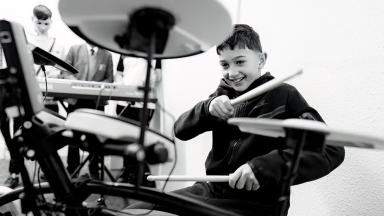It’s time to stand up for grassroots youth and community music.
English Teacher’s recent Mercury Prize success, and Ezra Collective’s the year before, were a win for grassroots music. They were a win for diversity. And a win for young musicians.
English Teacher was the first Mercury Prize winner from outside of London for 10 years (yes, that’s 10 years). They were quick to thank Music:Leeds in their acceptance speech, a Youth Music funded partner who supported them to record and distribute their music before they were signed.
Last year, Ezra Collective made history by being the first jazz act to win a Mercury. Band Leader Femi Koleoso told the audience, “Ezra Collective represents something really special because we met in a youth club … this moment that we’re celebrating right here is testimony to good, special people putting time and effort into young people to play music … “.
Given these two historic wins, you might think that grassroots music projects are thriving right now. That the ‘good, special people’ who spend their days helping young people to play music are finally reaping the rewards.
However, whilst Music:Leeds and Tomorrow’s Warriors are rightly receiving accolades for these successes, below the surface you’ll find a sector in crisis.
One quarter of youth spaces facing closure
Earlier this year we conducted a survey with the grassroots music projects in our network. We found that:
- A quarter of youth music spaces are considering closure.
- Over two-thirds reported being focused on short-term survival.
75% were concerned about the impact of the cost-of-living crisis on the young people they work with. 68% are having less success with funding applications; and 59% have seen a drop in income – at the same time as two-thirds report rising costs from utilities, rent, wages, supplies and equipment.
As one respondent told us,
“There has never been a greater need for our services and support at a time where we are unable to operate as we would like to, owing to restraints due to premises, access to necessary resources and funding to meet and increase capacity”.
What do we mean by ‘grassroots music projects’?
Grassroots music projects are a vital part of the music education and music industries ecosystem. Usually small in size, these organisations are usually not for profits, funded mostly through trusts and foundations. This includes Youth Music’s annual investment of over £10 million.
A defining feature of these projects is that they usually take place outside school, in local communities, and are run by local people. The term ‘grassroots’ means “involving the ordinary people in a society or organisation”. Included in those ‘ordinary’ people will be the likes of English Teacher, Ezra Collective, and others who will ‘make it’ in the music industries.
For every success story, there are literally thousands of other children and young people regularly making music. Youth Music funding alone supported over 120,000 children and young people in 2022/23. But when it comes to national debates on music strategy and music funding, young people are all too often unseen and unheard.
Behind the glitz and glamour of the Mercury Prize, grassroots music projects are dealing with increasingly complex issues facing young people. The cost of living crisis, arriving on top of the pandemic, has led to a perfect storm.
We asked projects whether they’d seen increases in issues facing young people in the last three years.
Nearly all reported increases in depression and anxiety. But worse, 75% said that have seen an increase in the number of children and young people experiencing a mental health crisis. In order words, three quarters have seen increases in severe mental health cases. On top of this:
- 77% have seen a rise in behavioural issues.
- 76% have seen increases in children experiencing low self-esteem; 49% in self-harm, and 33% in eating disorders.
- 69% have seen increased poverty, and 47% increased hunger.
- 27% have seen an increase in criminal exploitation and / or county lines.
These statistics are shocking.
“There is vast pressure on young people and the services that can support and protect them. We think that the youth work infrastructure in our area is severely depleted, leaving young people disconnected and unsupported. The issues above are not single issues they are all connected. A young person facing poverty will then be under greater mental health pressure and more susceptible to being exploited. The landscape has become much more complicated just as the support services have disappeared.”
“[My] team work with young people facing really tough times. We lost one of our young people three months ago, in a truly horrible way. At the same time, we had an online campaign against us for supporting a particularly difficult young person. This young person then attempted suicide. Thankfully [my organisation] were there in time, to stop him going through with it. These are just a couple of examples of the challenges that my team and I are facing more and more.”
Despite this crucial work of grassroots music projects, arts and cultural activities continue to be undervalued.
“One funder told us that in the current climate our work is only a "nice to have" and not essential. We work with disabled young people who would otherwise not be able to access music and are dependant on funded services to socialise and live a rich and normal life so it is very frustrating to feel like this is not valued.”
Read next...
Let’s Talk About the Class Ceiling in Music
The creative industries in the UK have a problem with working-class representation. How can we help to build a music industry that better reflects our society?
Wonderfall: Why Is the North Facing a Drop in Musicality?
Our new research has painted a stark picture of the current state of musicality in the north of England. We explore why young people are feeling a disconnect when it comes to making music.
Decolonising the Music Curriculum
From jungle to grime, UK garage to Afroswing, Black British music has shaped the world. So why isn’t it in classrooms? Remi Fairweather Stride, Chair of our IDEA Working Group, calls for faster progress in decolonising the music curriculum.



